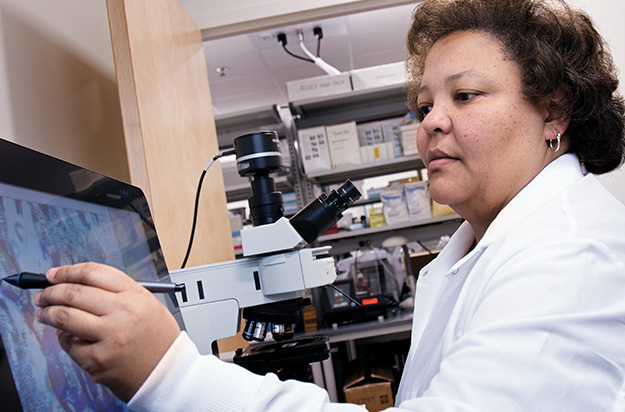Fall 2017: Building Livability
UTA researchers are creating a more sustainable, affordable North Texas for the future.
Skip to content. Skip to main navigation.
UTA researchers are creating a more sustainable, affordable North Texas for the future.
From carbon dioxide conversion to landfill mining, researchers at UTA are seeking viable alternative energy options.
Found in everything from space shuttles to dental fillings, composite materials have thoroughly infiltrated modern society. But their potential is still greatly untapped, offering researchers ample opportunity for discovery.
Within the particle showers created at the Large Hadron Collider, answers to some of the universe’s mysteries are waiting.
Model systems like pigeons can help illuminate our own evolutionary and genomic history.
UT Arlington's tiny windmills are bringing renewable energy to a whole new scale.
The stability of our highways, pipelines, and even manholes is reaching a breaking point.
Scientists believe they have discovered a subatomic particle that is crucial to understanding the universe.
UT Arlington researchers unlock clues to the human body’s most mysterious and complex organ.
UT Arlington researchers probe the hidden world of microbes in search of renewable energy sources.
Wounded soldiers are benefiting from Robert Gatchel’s program that combines physical rehabilitation with treatment for post-traumatic stress disorder.
Tiny sensors implanted in the body show promise in combating acid reflux disease, pain and other health problems.
Nanotechnology researchers pursue hybrid silicon chips with life-saving potential.
Biomedical engineers combat diseases with procedures that are painless to patients.

UTA kinesiologist Rhonda Prisby is making important breakthroughs in a topic that affects millions of people every day: bone regeneration. And she's one of the few in the country doing so.
The associate professor received a three-year, $250,000 National Science Foundation grant to design a revolutionary device that could stimulate bone growth. Ultimately, she and co-researcher Jeong-Bong Lee, a professor at UT Dallas, hope the machine could be used to help patients with osteoporosis and other bone ailments.
"If a person has been diagnosed with low bone mass, this could be the option for them," Dr. Prisby says.
She and Dr. Lee will design a small biomedical device to be implanted inside the bones of rats and activated over a length of time. They will then test for any bone growth in the animals stimulated by the device. If successful, it could assist people diagnosed with osteoporosis by lessening their risk of fracture.
Elderly patients are particularly prone to bone ailments, with the Centers for Disease Control estimating that one in four women over the age of 65 and one in six men over 65 suffer from osteoporosis.
Though the team's grant is currently focused on low bone mass conditions, Prisby and Lee believe the device could be developed in the future to help heal fractures in humans and perhaps even animals.
"Our society is aging rapidly. The potential of this device to improve the quality of life of elderly people is limitless," says Anne Bavier, dean of the College of Nursing and Health Innovation. "This is a classic example of the kind of work our college is doing to improve health and the human condition."
The UTA Department of Kinesiology continues to bolster its academic and research programs with an emphasis on the areas of health and disease across the lifespan. Its position in the College of Nursing and Health Innovation has helped to foster and promote many unique collaborations facilitating the performance of high-impact clinical translational research by its faculty.
This collaborative spirit can be seen in the college's research clusters focused on solving pressing issues for the betterment of humanity.
Bone/Muscle
Rhonda Prisby Kinesiology
Marco Brotto Nursing
Zui Pan Nursing
Cardiovascular—Neural
Cardiovascular Control
Paul Fadel Kinesiology
David Keller Kinesiology
Matt Brothers Kinesiology
Cardiovascular—Heart
Mike Nelson Kinesiology
Mark Haykowsky Nursing
Motor Control
Priscila Caçola Kinesiology
Mark Ricard Kinesiology
Cancer
Zui Pan Nursing
Mark Haykowsky Nursing
Marco Brotto Nursing